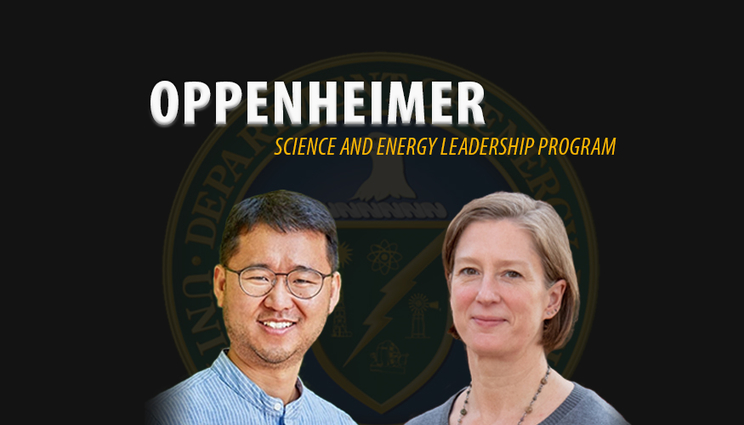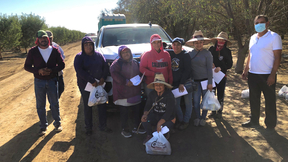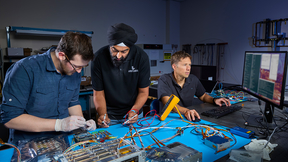Two LLNL scientists honored as 2022 Oppenheimer Science and Energy Leadership fellows
 (Download Image)
(Download Image)
The Oppenheimer Science and Energy Leadership Program has selectedmaterials scientist T. Yong Han and computer scientist Kathryn Mohror as 2022 fellows.
The Oppenheimer Science and Energy Leadership Program (OSELP) has selected Lawrence Livermore National Laboratory computer scientist Kathryn Mohror and materials scientist T. Yong Han as 2022 fellows.
Established in 2017, OSELP is a distinguished fellowship program that brings together exceptional leaders to explore the complexities, challenges and opportunities facing the national lab system and the Department of Energy (DOE).
Mohror and Han are two of the of 33 individuals representing all 17 of the DOE national labs this year, with professional backgrounds spanning technical, operational and strategic domains. Selection as an Oppenheimer fellow is a highly competitive process. Candidates are nominated by national lab directors, assessed by a committee of former national lab directors and former senior DOE officials and accepted into the program by the National Laboratory Directors’ Council (NLDC).
Mohror is a computer scientist working in LLNL’s Center for Applied Scientific Computing (CASC) in the Computing Directorate. She has worked at the Lab for 12 years, starting as a postdoctoral researcher and is now a group leader for the Parallel Systems Group in CASC.
Mohror conducts research in systems computer science for high performance computing, and her current focus is on I/O and data management performance. She also serves as the lead for the NNSA Software Technologies Portfolio for the U.S. Exascale Computing Project (ECP) and the LLNL point of contact for computer science to the Office of Science Advanced Scientific Computing Research (ASCR) program.
“I am beyond excited for this opportunity to learn more about the DOE national laboratory system,” she said. “Through laboratory visits and interactions with the program mentors and other program fellows, I will gain a deeper appreciation of the diverse scientific contributions and capabilities of the laboratories and also acquire a systems-level understanding of how the national laboratories operate and interact with DOE and the wider world.”
T. Yong Han is a materials scientist and group leader for Functional Material Synthesis & Integration in LLNL’s Materials Science Division.
Han also is the program group leader for the Production Enablement and Prototyping program element within the Weapon Physics and Design program at LLNL, managing a portfolio of projects with emphasis in developing agile and responsive capabilities in support of design studies and to accelerate integration of new and emerging materials and manufacturing technologies for Weapons and Complex Integration mission relevant areas.
“I am extremely honored to have been nominated by our director to participate in the Oppenheimer Science and Energy Leadership Program and to represent the Lawrence Livermore National Laboratory,” Han said. “The DOE-national lab system is currently facing unprecedented challenges caused by the pandemic. I plan to use this fellowship opportunity to build strong relationships with my cohort fellows from across the DOE lab system, learn from them and together address difficult challenges our institutions are now facing."
As the premier leadership development program of the NLDC, the Oppenheimer program is building the national lab leaders of tomorrow. Through an extensive series of virtual and in-person site visits to national labs, OSELP immerses its fellows in the singular breadth, diversity and complexity of the national labs, DOE and their partners, providing them with a unique opportunity to engage deeply with senior national lab leadership and explore innovative ways to improve the DOE and National Lab collective enterprise.
Throughout the program, OSELP fellows benefit from the experience and advice of program mentors who are drawn from former lab directors, former senior DOE officials and other highly distinguished professionals. Engagement with these senior leaders is expected to have a transformative impact on the perspectives and career trajectories of cohort members.
Throughout the year, the fellows develop thinkpieces that address major organizational, policy, scientific or other challenges within national labs’ mission space. Thinkpieces are presented to the NLDC and other senior leaders at a capstone event that closes the program in December in Washington, D.C.
For more details about the program and alumni fellows, go to the OSELP website.
Contact
 Anne M. Stark
Anne M. Stark
[email protected]
(925) 422-9799
Related Links
Oppenheimer Science and Energy Leadership ProgramTags
ASCAdvanced Materials and Manufacturing
Materials Science
HPC, Simulation, and Data Science
Computing
Physical and Life Sciences
Science
Careers
Featured Articles







